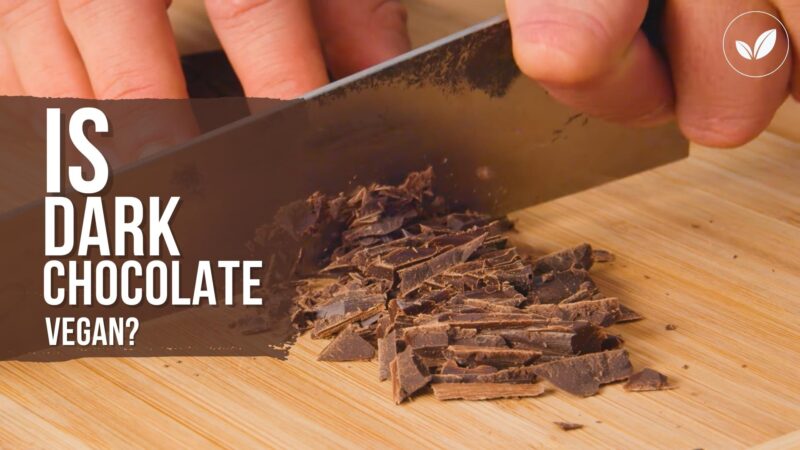Indulging in the delightful world of chocolate is a guilty pleasure many of us can’t resist. But for those who embrace a vegan lifestyle, the question arises: Is dark chocolate a sweet escape to satisfy their cravings?
In general, the answer is yes, but this may not be the case with all manufacturers. It’s not that simple! Let’s explore the fascinating world of cocoa, uncovering the truth behind whether or not dark chocolate can truly be not only considered a vegan’s dream treat but used to make countless vegan dishes that will give joy to everyone with a sweet tooth!
Cacao Beans
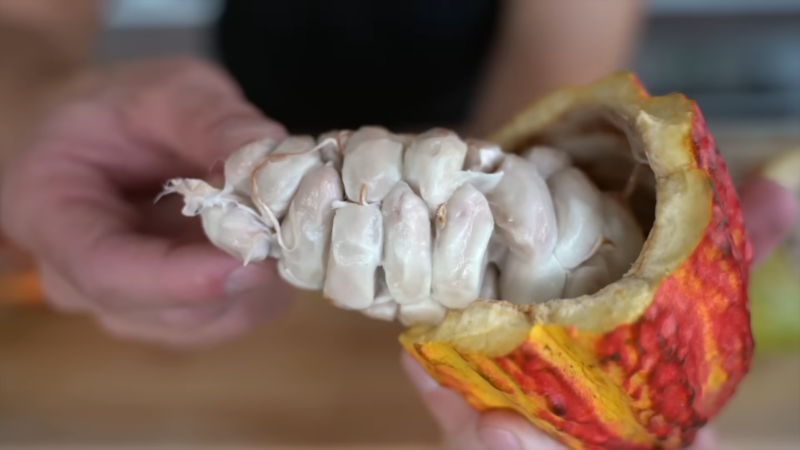
The journey starts with the diligent harvesting of cacao pods, typically done by hand due to the delicate nature of cacao trees. The pods are opened to reveal cacao beans which are then extracted, often along with the fruity pulp that encases them.
What follows is a natural process of fermentation, which lasts several days and kickstarts the development of the complex flavors we associate with chocolate. Once fermentation is complete, the beans are spread out to dry in the sun, another step towards flavor development and a crucial one to prevent mold growth.
The beans are then roasted, a process that really brings out the quintessential chocolate flavor we all recognize. Post-roasting, the beans are cracked open to expose the nibs, the part of the bean actually used to make chocolate.
The nibs are then ground to form a thick paste known as chocolate liquor (a name that can be misleading as there’s no alcohol involved!). The liquor is a blend of cocoa solids and cocoa butter, the fundamental ingredients that go into making most chocolate products.
Different Types
Different kinds of chocolate we find in stores today – dark, milk, and white – owe their distinct characteristics to their unique compositions. Dark chocolate is characterized by a high percentage of cocoa solids and cocoa butter, with little to no milk.
It’s the purest form you can consume, and it’s often preferred by true chocolate connoisseurs. On the other hand, milk chocolate, as the name suggests, includes milk or milk powder in its recipe, which gives it a milder, creamier taste.
White chocolate is quite a misnomer as it does not contain any cocoa solids, only cocoa butter mixed with sugar and milk. Understanding this key distinction is crucial as it aids in demystifying why dark chocolate could potentially fit into a vegan diet, unlike its milk and white counterparts.
However, to arrive at a definitive answer, let’s scrutinize its composition and explore its relationship with veganism more deeply.
Can it be consumed by vegans?
Ingredients
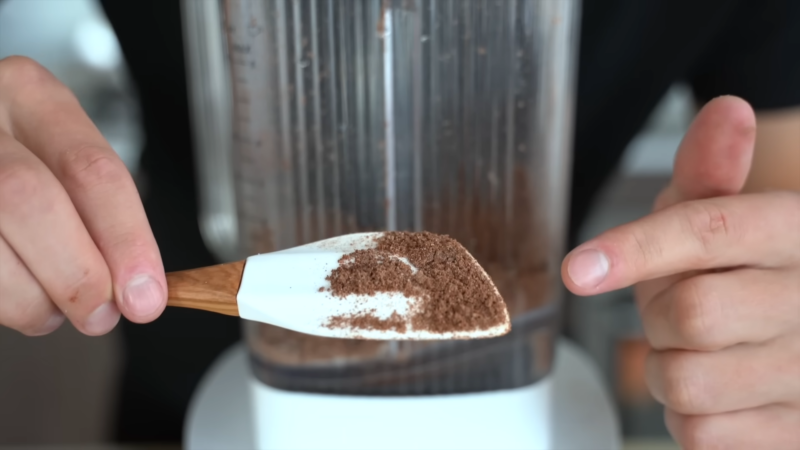
Dark chocolate is typically made with a handful of basic ingredients: cocoa beans (which break down into cocoa solids and cocoa butter), sugar, and often an emulsifier like soy lecithin to maintain a smooth, uniform texture. Some high-quality, gourmet dark chocolates simplify it further and contain only cocoa and sugar.
None of these ingredients are derived from animals, suggesting that dark chocolate, in its most basic form, could indeed be vegan-friendly. However, a crucial point to note is that some brands might include milk or milk derivatives in their products, a practice often used to mellow the intense flavor of dark chocolate.
This means that even if the core of it is plant-based, some variants available in the market might not be suitable for vegans. Hence, the importance of reading ingredient lists cannot be overstated for vegans.
Potential Non-Vegan Additives
This lovely treat might contain other non-vegan additives besides milk. For instance, some manufacturers use sugar processed with bone char, a product made from animal bones, which is a no-go for strict vegans.
Furthermore, certain emulsifiers, like lecithin, may be sourced from eggs instead of soy, making the product non-vegan.
Another potential concern could be cross-contamination during the manufacturing process. Equipment used to process milk chocolate might also be used for dark types, leading to trace amounts of milk ending up in the final product.
While this might not concern some, it could be a deal-breaker for others who follow a strict vegan diet.
Vegan-Friendly Brands
While it’s true that some dark chocolates may contain animal-derived additives, there’s good news. Many brands have recognized the growing trend of veganism and have risen to the challenge by offering truly vegan options.
Endangered Species Chocolate
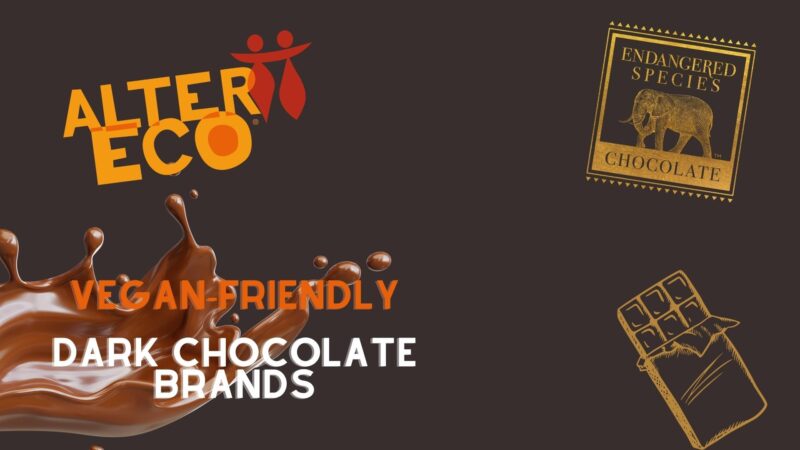
| Brand | Product | Main Ingredients | Cocoa Content | Special Features |
|---|---|---|---|---|
| Endangered Species Chocolate | Vegan Dark Chocolates | Cocoa, Sugar, Vanilla | Ranges from semi-sweet 60% to intensely dark 88% | Ethically traded, sourced from small family-owned properties in West Africa, supports wildlife conservation |
Endangered Species Chocolate offers a range of high-quality, ethically traded, and vegan dark chocolates. Their products are made from cocoa sourced from small family-owned properties in West Africa, where sustainable farming practices are followed.
A significant portion of their profits is invested back into the communities through wildlife conservation efforts. This company’s dark chocolates are made from just cocoa, sugar, and vanilla, making them an excellent choice for vegans.
Plus, they have a range of cocoa content, from semi-sweet 60% to intensely dark 88% bars, catering to various preferences. However, as with any product, make sure to check the ingredients list for any potential non-vegan additives before purchasing.
Alter Eco
| Brand | Product Variety | Ingredients | Special Features | Sustainability Practices |
|---|---|---|---|---|
| Alter Eco | Vegan dark chocolates (e.g., Dark Salted Brown Butter Organic Chocolate, Deep Dark Sea Salt Organic Chocolate) | Ethically sourced, organic ingredients. Free from artificial emulsifiers and sweeteners. Variety of intriguing flavors. Eco-friendly packaging. | Promotes agroforestry. Works with small-scale farmers to ensure fair trade and sustainable practices. |
Alter Eco is another brand that deserves a mention for its variety of vegan dark chocolates. Their products are made with ethically sourced, organic ingredients, and are free from artificial emulsifiers and sweeteners.
They promote agroforestry and work with small-scale farmers to ensure fair trade and sustainable practices.
From their Dark Salted Brown Butter to their Deep Dark Sea Salt Organic Chocolate, they offer a range of intriguing flavors that are as ethical as they are delicious. Their packaging is also eco-friendly, furthering their commitment to sustainability. Yet again, ensure to read the labels before buying to avoid any potential issues.
What are the health benefits of this treat?

This delicious treat has many health benefits, believe it or not:
| Health Benefit | Description |
|---|---|
| Heart Health | Dark chocolate flavonoids may support heart health by improving blood flow and reducing blood pressure. |
| Antioxidant Properties | The rich cocoa content provides antioxidants that combat free radicals and reduce oxidative stress. |
| Improved Cholesterol Levels | It may help increase HDL (good) cholesterol levels and reduce LDL (bad) cholesterol levels. |
| Enhanced Brain Function | Consumption of dark chocolate is associated with improved cognitive function and memory due to flavonoids. |
| Mood Booster | Dark chocolate can trigger the release of endorphins, promoting feelings of pleasure and reducing stress. |
| Anti-Inflammatory Effects | The antioxidants in dark chocolate may have anti-inflammatory properties. |
| Skin Health | Its flavonoids contribute to skin protection, reducing UV damage and promoting hydration. |
| Source of Minerals | It contains essential minerals such as iron, magnesium, copper, and manganese. |
How to Make Your Own Vegan Treat?
If you’re finding it challenging to locate vegan dark chocolate in your local stores, or if you simply fancy yourself a culinary adventurer, why not consider making your own at home? The process is far less complicated than you might think!
Ingredients
This requires only a few simple, easily accessible ingredients: cocoa butter, cocoa powder, a plant-based sweetener like maple syrup or agave nectar, and vanilla extract for added flavor. You’ll also need a mold to give your homemade chocolate its shape.
Preparation
The process essentially involves melting the cocoa butter, then, mixing in the other ingredients until you achieve a smooth consistency. Once blended well, the mixture is poured into molds before being allowed to cool and harden. The result? A batch of delicious, homemade vegan dark chocolate that you can truly call your own.
Personalize your treat!
One of the most rewarding aspects of making your own chocolate is the ability to customize it to your taste. You can experiment with different flavor profiles by adding inclusions like sea salt, nuts, dried fruit, or spices.
You could also play around with the ratio of cocoa to sweeteners to create the perfect treat that matches your palate’s preferences.
Remember, creating your own dark chocolate is not just about the end product; it’s also about the process. Enjoy the journey, and remember that practice makes perfect.
With each batch, you’ll gain a deeper understanding of the process, and soon, you’ll have a homemade vegan dark chocolate that rivals any store-bought bar!
FAQs
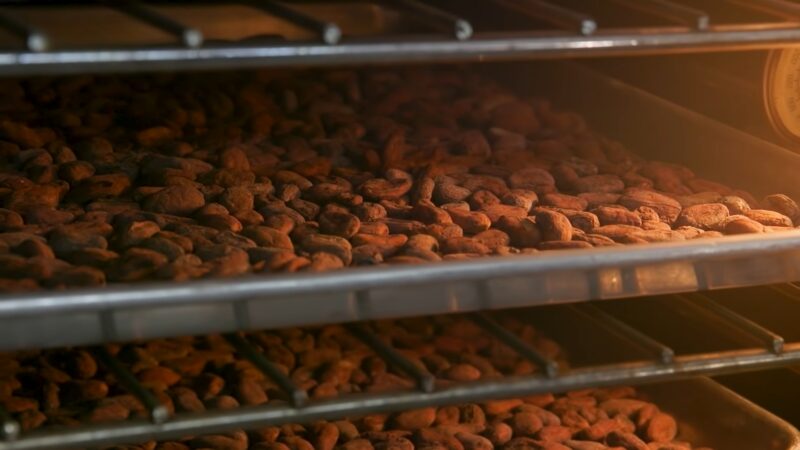
Does vegan dark chocolate contain palm oil?
Some brands may contain palm oil, but many do not.
Is it more expensive?
The price of this type of chocolate can vary, but it’s not necessarily more expensive than a non-vegan one.
Can I use it in baking?
Yes, it can be used in baking just like regular dark chocolate.
Does vegan dark chocolate contain soy?
Some brands may contain soy lecithin, but not all do.
Is it good for the environment?
Its environmental impact depends on factors like how the cocoa is sourced and whether it’s fair trade.

The Bottom Line
In its fundamental essence, dark chocolate can indeed be vegan. Its core ingredients – cocoa and sugar – are plant-based. However, variations in recipes across manufacturers mean that not all brands you find on the market is vegan.
Therefore, you should always check the ingredients list and watch out for any potential animal-derived additives or risk of cross-contamination. If you have a soft spot for this treat, there’s no need to deny yourself the pleasure of this bittersweet symphony.
Many ethical brands are catering to the vegan market with dark chocolate options, and if you’d like to take matters into your own hands, you always have the choice to create your own custom chocolate at home.
Whether you are just starting out as a vegan, or have been one for a long time, there’s bound to be chocolate that will be perfect for you. So, go ahead and enjoy your treat – the vegan way!

